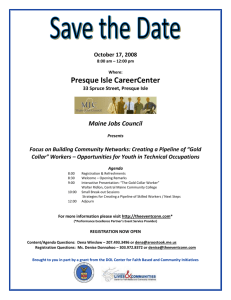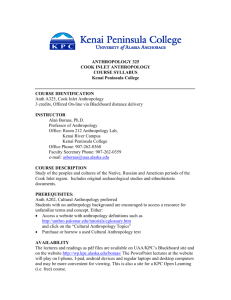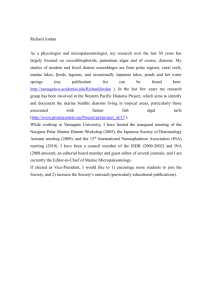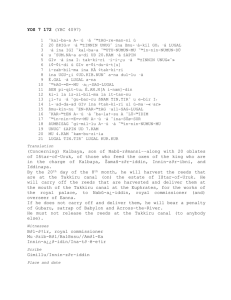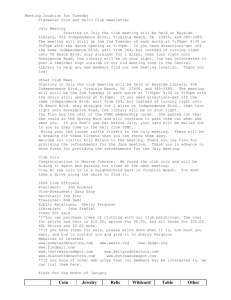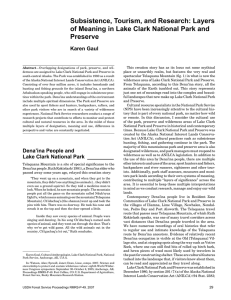Peter Kalifornsky - University of Alaska
advertisement
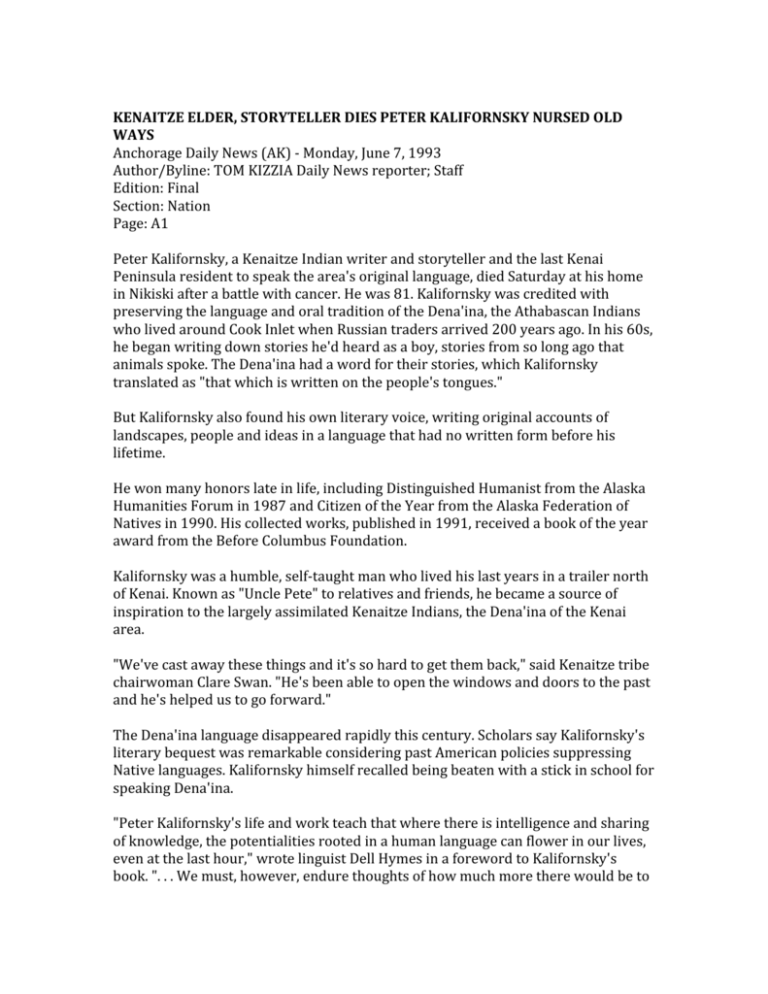
KENAITZE ELDER, STORYTELLER DIES PETER KALIFORNSKY NURSED OLD WAYS Anchorage Daily News (AK) ‐ Monday, June 7, 1993 Author/Byline: TOM KIZZIA Daily News reporter; Staff Edition: Final Section: Nation Page: A1 Peter Kalifornsky, a Kenaitze Indian writer and storyteller and the last Kenai Peninsula resident to speak the area's original language, died Saturday at his home in Nikiski after a battle with cancer. He was 81. Kalifornsky was credited with preserving the language and oral tradition of the Dena'ina, the Athabascan Indians who lived around Cook Inlet when Russian traders arrived 200 years ago. In his 60s, he began writing down stories he'd heard as a boy, stories from so long ago that animals spoke. The Dena'ina had a word for their stories, which Kalifornsky translated as "that which is written on the people's tongues." But Kalifornsky also found his own literary voice, writing original accounts of landscapes, people and ideas in a language that had no written form before his lifetime. He won many honors late in life, including Distinguished Humanist from the Alaska Humanities Forum in 1987 and Citizen of the Year from the Alaska Federation of Natives in 1990. His collected works, published in 1991, received a book of the year award from the Before Columbus Foundation. Kalifornsky was a humble, self‐taught man who lived his last years in a trailer north of Kenai. Known as "Uncle Pete" to relatives and friends, he became a source of inspiration to the largely assimilated Kenaitze Indians, the Dena'ina of the Kenai area. "We've cast away these things and it's so hard to get them back," said Kenaitze tribe chairwoman Clare Swan. "He's been able to open the windows and doors to the past and he's helped us to go forward." The Dena'ina language disappeared rapidly this century. Scholars say Kalifornsky's literary bequest was remarkable considering past American policies suppressing Native languages. Kalifornsky himself recalled being beaten with a stick in school for speaking Dena'ina. "Peter Kalifornsky's life and work teach that where there is intelligence and sharing of knowledge, the potentialities rooted in a human language can flower in our lives, even at the last hour," wrote linguist Dell Hymes in a foreword to Kalifornsky's book. ". . . We must, however, endure thoughts of how much more there would be to be grateful for if those who came last to Alaska had been willing to learn and respect the way of life of those whose lands they overran." The Cook Inlet Dena'ina spoke three dialects that were so different they could have been called separate languages, according to James Kari, a linguist with the Alaska Native Language Center at the University of Alaska Fairbanks. The Kenai Peninsula language was called the "Outer Inlet" dialect. Only a few elderly people in Tyonek still speak that dialect, Kari said. Peter Kalifornsky was descended from the man who was chief of Ski'tuk, the Indian village at the present site of Kenai. According to a family story, the chief's son, Peter's great‐great‐grandfather, accompanied the Russians to Fort Ross in Spanish California, and was dubbed "Kalifornsky" when he returned to the Kenai Peninsula. Kalifornsky was born in 1911 at a village on the Cook Inlet beach south of Kenai that bore the family's name. The family of his mother, who died when Peter was 2, was even more distinguished. His mother's brother, Theodore Chickalusion, was the last traditional chief of the Cook Inlet Dena'ina. Kalifornsky spent his first 10 years in villages that are now abandoned: Kalifornsky Village on the Kenai Peninsula, and Kustatan and the Polly Creek clam camp on the wilder west side of Cook Inlet, where he was instructed by his uncle and other elders. Many of the old stories, or sukdu, came from those years. Kalifornsky also learned the traditional Dena'ina songs that were hummed all day to focus the mind. "Like prayer, something like praying all the time," Kalifornsky said of the songs in 1991. The songs were forgotten, he said, when an elderly teacher cleansed his mind in a steambath ceremony designed to prepare the boy for modern life in Kenai. Kalifornsky had only five years of formal education in territorial schools. While living in Kenai, he was instructed in the Russian Orthodox Church by his father, a lay reader, and his Dena'ina education continued as well under an old man named Feodore Sasha, the last of the Russian River Athabascans, to whom Kalifornsky's 1991 book was dedicated. In 1938 Kalifornsky married the late Agrafena Sacaloff of Seldovia. They had one son, Sam Holstrom, and raised Agrafena's daughter, Eva Holstrom Lorenzo. Kalifornsky worked as a dory builder in Kenai, a rock‐driller on the Alaska Railroad tunnels at Whittier and a laborer on military construction projects in the Aleutians. Hard times hit in 1957, the year of the Kenai oil boom, when Kalifornsky returned from a year in Seattle where he had been treated for tuberculosis, according to a biography by Soldotna anthropologist Alan Boraas. "It was a harsh homecoming. His wife had left him. His house had been stripped of its furniture, the windows broken out and the door pulled from its hinges. It was the low point of his life." Kalifornsky held on through a decade of arthritis and unemployment until a 1972 effort to revive a traditional potlatch ceremony quickened his interest in his heritage. That same year he met linguist Kari, who was hunting the last fluent Dena'ina speakers. Along with his sisters, Fedosia Sacaloff and Mary Nissen, and a third Kenai woman, Bertha Monfor, Kalifornsky helped develop a written form for the language. Kalifornsky began keeping a notebook on his own, in Dena'ina. His subsequent writings included traditional stories, language and history lessons, translations of hymns, and accounts of his own travels. He followed his ancestor's path to California, visiting historic Fort Ross and Disneyland (his Dena'ina word for the latter translates as "other world place"). Two early collections of his work lapsed out of print. But in March 1989, on the day of his sister Fedosia's funeral, Kalifornsky asked Kari and Boraas for help assembling a complete volume, which was published under the title "K'tl'egh'i Sukdu, A Dena'ina Legacy." In his later years, Kalifornsky became more involved in the affairs of the Kenaitze, who were attempting to revive their sense of cultural identity. He helped restore the weed‐choked cemetery at Kalifornsky Village, building crosses for the nearly forgotten graves of his ancestors, and attended an Orthodox ceremony at the graveyard every fall. One of his most powerful original pieces, "The Potlatch Song of the Lonely Man," told how it felt to be the last alive. He said the song came to him in a dream. Performing the song, always in Dena'ina, he began singing slowly and plaintively: "Where else might we be scattered to? "Where are our relatives? "Where are the friends who might come to us with cheer? "Where are our loved ones who might come to us with kindness?" Several years after he recorded those sad questions, a follow‐up verse came to him, which he sang with jubilation. The second verse, said Boraas, was a testament to the power Peter Kalifornsky had found in words. "Our relatives have come back to us, have come back to us. "Our friends with cheer, too, have come back to us, have come back to us. "Our loved ones with kindness, too, have come back to us, have come back to us."
